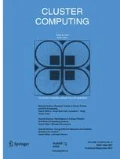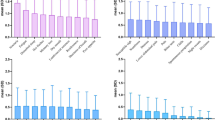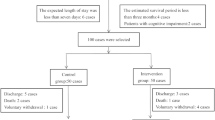Abstract
To investigate the effect of palliative care on the psychological status of patients with advanced cancer. 106 elderly patients with cancer pain were randomly divided into observation group and control group, before enrollment, the symptoms check list was filled to assess the patient’s mental health level; the control group received conventional cancer nursing intervention, the observation group received palliative care intervention in addition to conventional nursing. 2 weeks after nursing intervention, The symptom check list(SCL-90) and Functional Assessment of Cancer Therapy-General(FACT-G) were released in the same way and the two groups of patients were re-evaluated. Symptom check list of the two groups before enrollment was higher than that of the national norm; after 2 weeks of nursing intervention, the score of symptom check list in the observation group was lower than that in the control group. The total scores total number of positive symptoms and the mean was lower than that before the intervention, with significant difference. Palliative care can effectively improve the advanced cancer patients somatization, coercion, interpersonal sensitivity, anxiety, depression and other adverse psychological conditions.
Similar content being viewed by others
Reference
Duggleby, W.: Elderly hospice cancer patients’ descriptions of their pain experiences. Am. J. Hosp. Palliat. Care 17(2), 111–117 (2000)
Hui, D., De, l.C.M, Thorney, S., et al.: The frequency and correlates of spiritual distress among patients with advanced cancer admitted to an acute palliative care unit. Am. J. Hosp. Palliat. Care 28(4), 264 (2011)
Patel, M.I., Bhattacharya, J., Asch, S.M., et al.: Acceptance of advance directives and palliative care referral for veterans with advanced cancer: a retrospective analysis. Am. J. Hosp. Palliat. Care 33(8), 742 (2016)
Seyedfatemi, N., Borimnejad, L., Mardani, H.M., et al.: Iranian nurses’ perceptions of palliative care for patients with cancer pain. Int. J. Palliat. Nurs. 20(2), 69 (2014)
De, W.K.: Palliative care problems in the elderly patients. Prz. Lek. 59(4–5), 355 (2002)
Thompson, G.N., Chochinov, H.M., Wilson, K.G., et al.: Prognostic acceptance and the well-being of patients receiving palliative care for cancer. J. Clin. Oncol. 27(34), 5757 (2009)
Dionneodom, J.N., Azuero, A., Lyons, K.D., et al.: Benefits of early versus delayed palliative care to informal family caregivers of patients with advanced cancer: outcomes from the ENABLE III randomized controlled trial. J. Clin. Oncol. 33(13), 1446–1452 (2015)
Dawber, R., Armour, K., Ferry, P., et al.: Comparison of informal caregiver and named nurse assessment of symptoms in elderly patients dying in hospital using the palliative outcome scale. Bmj Support. Palliat. Care (2016). https://doi.org/10.1136/bmjspcare-2015-000850
Kim, M., Cho, C., Lee, C.: A concept analysis of quality of dying and death (QODD) for non-cancer patients:from the perspective of palliative care. Asian J. Hum. Serv. 9, 96–106 (2015)
Burton, A.W.: What every professional working in palliative care should know about cancer pain management. Psicooncol. Investig. Y Clín. Biopsicosoc. En Oncol 1, 57–90 (2004)
Davis, E.L., Deane, F.P., Gcb, L., et al.: Is higher acceptance associated with less anticipatory grief among patients in palliative care? J. Pain Symp. Manag. 54(1), 120 (2017)
Zhang, Y., Algburi, A., Wang, N., Kholodovych, V., Oh, D.O., Chikindas, M., Uhrich, K.E.: Self-assembled cationic amphiphiles as antimicrobial peptides mimics: Role of hydrophobicity, linkage type, and assembly state. Nanomedicine 13(2), 343–352 (2017)
Arunkumar, N., Kumar, K.R., Venkataraman, V.: Automatic detection of epileptic seizures using new entropy measures. J. Med. Imag. Health Inf. 6(3), 724–730 (2016)
Hamza, R., Muhammad, K., Nachiappan, A., González, G.R.: Hash based encryption for keyframes of diagnostic hysteroscopy. IEEE Access (2017). https://doi.org/10.1109/ACCESS.2017.2762405
Abdelhamid, D.S., Zhang, Y., Lewis, D.R., Moghe, P.V., Welsh, W.J., Uhrich, K.E.: Tartaric acid-based amphiphilic macromolecules with ether linkages exhibit enhanced repression of oxidized low density lipoprotein uptake. Biomaterials 53, 32–39 (2015)
Arunkumar, N., Ramkumar, K., Hema, S., Nithya, A., Prakash, P., Kirthika, V.: Fuzzy Lyapunov exponent based onset detection of the epileptic seizures. In: Proceedings of 2013 IEEE Conference on Information and Communication Technologies, ICT 2013, art. no. 6558185, pp. 701–706. (2013)
Chen, X., Pang, L., Guo, P., Sun, X., Xue, Z., Arunkumar, N.: New upper degree of freedom in transmission system based on wireless G-MIMO communication channel. Clust. Comput. (2017). https://doi.org/10.1007/s10586-017-1513-0
Fernandes, S.L., Gurupur, V.P., Sunder, N.R., Arunkumar, N., Kadry, S.: A novel nonintrusive decision support approach for heart rate measurement. Pattern Recognit. Lett. (2017). https://doi.org/10.1016/j.patrec.2017.07.002
Author information
Authors and Affiliations
Corresponding author
Rights and permissions
About this article
Cite this article
Xi, K., Huiyu, L., Xiaohua, H. et al. Fuzzy regression model clustering algorithm based assessment, analysis and acceptance of palliative care and psychological behaviors of elderly patients with cancer pain. Cluster Comput 22 (Suppl 2), 4813–4820 (2019). https://doi.org/10.1007/s10586-018-2391-9
Received:
Revised:
Accepted:
Published:
Issue Date:
DOI: https://doi.org/10.1007/s10586-018-2391-9




